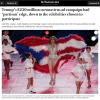MOSCOW — Joe Biden has called Russia's Vladimir Putin a "KGB thug," mocked President Trump as "Putin's puppy" and
described Russia the biggest threat to the United States.
It adds up to clues on what a possible Biden presidency would mean for Moscow.
Follow the latest on Election 2020
Under Biden, Washington would likely re-engage with NATO and other allies in a sharp about-face from Trump’s isolationist approach. Biden also has signaled that he would take harsher measures seeking to curb Moscow’s malfeasance and interference in Western democracies and elections.
It is no surprise then that Putin has made clear his preference for four more years of Trump — criticizing the former vice president’s “sharp anti-Russian rhetoric.”
The Trump administration’s Russia policy has displayed multiple personalities. Despite Trump’s admiration for Putin and insistence that good Russia-U. S. ties are a benefit to all, his administration maintained — and added to — Obama-era sanctions against Russia and Russian businesses and figures close to the Kremlin.
It also withdrew from the Intermediate Range Nuclear Forces Treaty last year, accusing Russia of cheating, and sent military equipment to Ukraine to help it in its war against Russian-backed separatists.
Russia’s election interference efforts continue, according to Western intelligence agencies and others,
amplifying messages aimed at undermining confidence in American democracy. And Trump’s personal lawyer,
Rudolph Giuliani, has been targeted by alleged Russian agent in Ukraine, Andriy Derkach, attempting to feed disinformation to Trump, according to former U.S. officials.
'More predictable'
Tatyana Stanovaya, founder of Moscow-based think tank
R. Politik, said in an interview that Russia sees the U.S. political establishment as avowedly anti-Russian. But Trump was such an unpredictable, anti-establishment leader that Putin hoped this might produce some deals that would be impossible under anyone else. That has not panned out.
Moreover, Russia’s diplomatic elite do not share Putin’s hopes about Trump, she said.
“If you don’t consider Putin’s hopes, Russian leaders in general are very skeptical about Trump, much more skeptical than they used to be,” she said.
Russia leaders expect Biden, if elected, would be more critical of Russia’s geopolitical agenda and potentially may take more punitive actions such as additional sanctions, but felt at least he might usher in a more predictable strategic relationship.
“In the Kremlin, people are very tired from Trump,” Stanovaya said. “A lot of hopes failed and even if we imagine that tomorrow we could seal a deal with Trump somewhere — take Syria or some other topics — we can’t believe that he would be able to secure this deal at home. So we can’t really count on Trump.”
“With Biden,” she added, “we will maybe have more difficulties in the post-Soviet space. It’s expected we will have more disagreements about most of our geopolitical agenda. But it will be more predictable, and that’s a good point in the current situation.”

A second Trump term “would usher in a period of disorder and bristling conflict, as countries heed the law of the jungle and scramble to fend for themselves,” wrote
Eliot A. Cohen, a former State Department official under George W. Bush and
former member of the Republican Party in Foreign Affairs magazine Tuesday.
Andrew S. Weiss, of the Carnegie Endowment for International Peace, described Trump as a “sledgehammer” against the foundations of U.S. policy toward Russia.
“Ever since Donald Trump came on the scene he has been willing to say and do things that fly in the face of decades of bipartisan foreign policy on Russia,” he said.
“He denigrated the alliance system that the U.S. has carefully assembled since World War II,” he added. “He made it seem like there was some magic benefit from getting along with Russia. So what’s not to like, from the Kremlin’s perspective?”
Biden foreign policy begins with telling the world: ‘America’s back’
Biden has
indicated that he would reinvigorate alliances, rejoin the
Paris Climate Accord and the
World Health Organization. He would also pursue an extension of the
New START nuclear arms limitation treaty with Russia and has no plans to ease sanctions against Russia.
In January 2018, calling Putin a KGB thug, Biden
said Russian power was about “a kleptocracy protecting itself.” Putin, he said, seemed to believe that Russia could not compete against a unified West, “so everything he can do to dismantle the post-World War II liberal order, including NATO and the E.U., I think, is viewed as in their immediate self-interest.”
Biden, speaking at a Council on Foreign Relations event, said Russia was subverting U.S. and European institutions using energy, disinformation, cyberattacks, corruption and raw power.
In response, Washington must “make it clear to Russia that they are going to pay a price for many of the things they have done, in addition to making sure that we just, in effect, advertise to the Russian population and to all of Western Europe what they’re actually doing.”


“I think the Russians are just deeply conflicted about whether they prefer a world of stability or instability,” he said. “The problem for the Russians is that they’ve gotten themselves into a situation where their influence seems to depend on trouble making. It doesn’t depend on acceptance and constructive interaction with other major powers, in particular the United States.”
An incoming Biden administration might conclude that Russia had fallen so far down the global pecking order that it was irrelevant to the issues of greatest global importance to the United States.
“The sad news for Putin may be that a Biden administration doesn’t want either a bad or good relationship with him, but just less of one than we’ve been used to having,” he added.
Whoever wins the White House, a long acrimonious period in relations with Moscow lies ahead, Weiss predicted.
“Russia is in part acting this way because it feels like it can and there’s no significant penalty for what it’s doing and I don’t necessarily expect that to change overnight.”





















